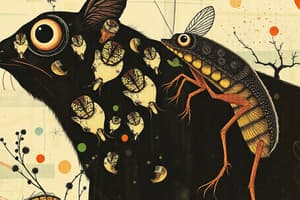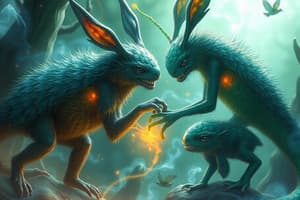Podcast
Questions and Answers
What is a predator?
What is a predator?
- A relationship where one organism benefits and the other is unaffected
- An organism that is killed and eaten by another organism
- A relationship between two species where one benefits
- An animal that hunts other animals for food (correct)
What is prey?
What is prey?
- A relationship between two species where both benefit
- An animal that hunts other animals for food
- An organism that is killed and eaten by another organism (correct)
- The struggle between organisms to survive
What does symbiosis mean?
What does symbiosis mean?
- Competition between two organisms
- Living separately, no relationship between 2 species
- Living together, a close relationship between 2 species (correct)
- A harmful relationship
What type of relationship is mutualism?
What type of relationship is mutualism?
Which of the following is considered parasitic?
Which of the following is considered parasitic?
A bird living in a tree is an example of which relationship?
A bird living in a tree is an example of which relationship?
In complete sentences, describe a predator/prey relationship.
In complete sentences, describe a predator/prey relationship.
In complete sentences, describe the differences between intraspecific and interspecific competition.
In complete sentences, describe the differences between intraspecific and interspecific competition.
In complete sentences, explain the similarities and differences between a predator/prey relationship and a parasitic relationship.
In complete sentences, explain the similarities and differences between a predator/prey relationship and a parasitic relationship.
Study Notes
Ecological Relationships Glossary
- Predator: An animal that actively hunts other animals as a food source.
- Prey: An organism that is hunted and consumed by another organism.
- Symbiosis: Close associations between organisms that typically live together and benefit from each other.
- Mutualism: A symbiotic relationship where both species involved gain benefits.
- Parasitism: A relationship where one organism benefits at the expense of another, causing harm.
- Commensalism: A relationship benefiting one organism while the other remains unaffected.
- Competition: The struggle for survival among organisms in a habitat with limited resources.
Types of Competition
- Interspecific Competition: Competition that occurs between members of different species.
- Intraspecific Competition: Competition occurring among members of the same species.
Ecological Relationships
- Trophic Cascade: Indirect interactions in ecosystems that can lead to significant changes.
- Negative Ecological Relationships: Relationships that negatively impact an organism.
- Positive Ecological Relationships: Relationships that positively influence an organism.
- Direct Ecological Relationships: Immediate interactions between different trophic levels.
- Indirect Ecological Relationships: Occasional interactions between different trophic levels.
Understanding Symbiosis and Related Concepts
- Ecological Relationship Models: Frameworks that describe interactions among organisms in ecosystems.
- Interpreting Graphs: The skill of analyzing and understanding what data visualizations represent.
Questions Overview
- Examples of Parasitic Relationships: Ticks feeding on dogs.
- Mutualistic Relationships Explanation: Ants and acacia trees benefit each other through their interaction.
- Definition of Symbiosis: Close living relationship between two species.
- Mutualism Clarification: Both species gain from the relationship.
Relationship Types
- Commensalism Example: A bird living in a tree where it is neither helped nor harmed.
- Mutualism and Commensalism: Distinction is crucial; mutualism benefits both parties while commensalism only benefits one.
- Parasitism Example: One organism benefits while harming another.
Comparing Relationships
- Predator/Prey Dynamics: The predator gains energy from consuming the prey, resulting in harm to the prey, akin to parasitism but differing in mechanism.
- Intraspecific vs. Interspecific Competition: Intraspecific involves competition within a single species, while interspecific involves competition across different species.
- Similarities in Predator/Prey and Parasitic Relationships: Both involve interactions where one organism benefits at the cost of another, yet the methods of obtaining benefit differ.
Studying That Suits You
Use AI to generate personalized quizzes and flashcards to suit your learning preferences.
Description
This quiz focuses on key terms and definitions related to ecological relationships. Learn about predators, prey, symbiosis, and mutualism to better understand interactions in ecosystems. Test your knowledge with these flashcards designed for biology enthusiasts.




